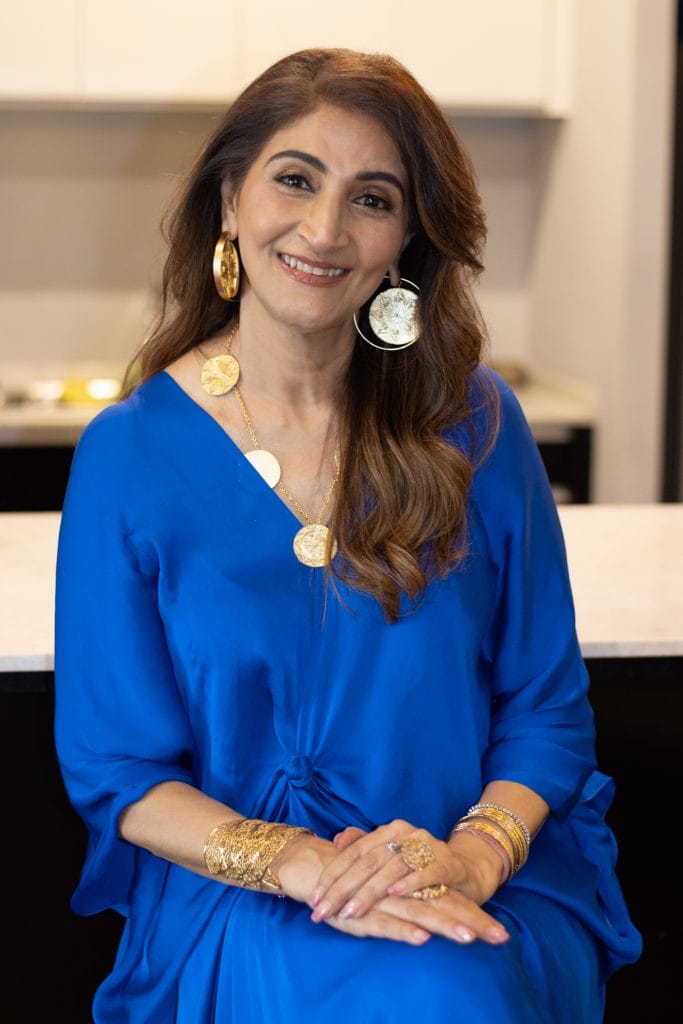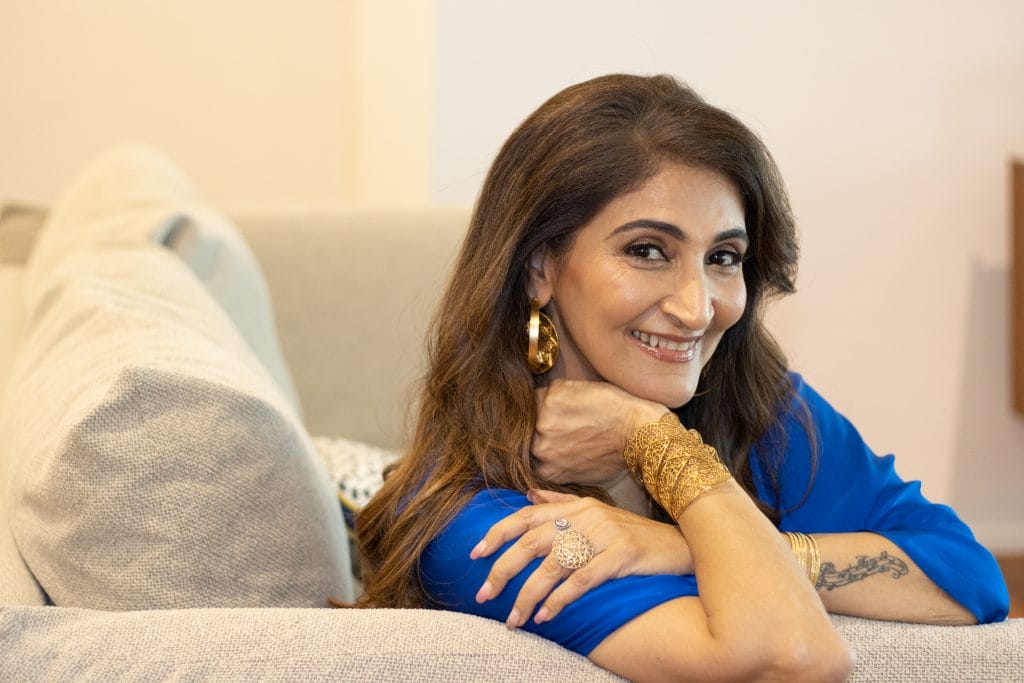She’s championing women wherever she goes!
By Shaan Bajaj
I have my grandparents to thank for insisting I learn about my roots: I spent countless hours perfecting my Punjabi, along with learning various Indian dance forms and musical instruments, from Bhangra, to Kathak, harmonium, sitar, and tabla. At the time, I could not fully grasp the importance of it, and I must admit, I huffed and puffed a lot. As time has gone by though, I really appreciate having such a strong connection with my heritage; it is a comforting reminderof where I come from. Much like my grandparents, Geeta Rattan, President of the Indian Women’s Club (IWC), is tapping into the strength of women-led communities to preserve and share the breadth of Indian culture, in the hopes of forming strong ties between the Motherland and Indian communities settled here.
Coming from the cosmopolitan city of Mumbai, Geeta moved to Bangkok when she got married in 1982. Before the move, she held a Master’s in commerce and came from a Bollywood family – in fact, her brother is Kunal Kapoor. Once married, she did not want to sit at home while her husband ran a textile business in Sampheng. She started teaching English at Assumption Business Administration College, before an opportunity allowed her to join her husband. She says, “I was a key part of our business, and one of the very few Indian women working in Sampheng at the time; it was a total man’s world. It left me with a lot of confidence, that even as a foreigner I could fit into this world.”
Geeta recently turned 60 and started her own business, while consulting on her kids’ ventures. When I asked her about what her professional life looks like at 60, she confidently replies, “I don’t feel life ends at 60, instead I feel like there is so much to learn and do, and I am really happy to support my children and the wider community with IWC.” To learn more about her role in championing Indian culture and the women of our Indian communities in Thailand, Masala sat down with Geeta to talk about the Indian Women’s Club and how necessary it is today.
You are currently the President of the Indian Women’s Club – when was it founded, and why was the club established?
It was founded in 1975, by Mrs. Malik, the wife of a previous Indian Ambassador to Thailand, with 25 founding members from prominent Indian businesses settled in Bangkok. It was established to raise funds for royal charity projects and strengthen ties between Thailand and India. The members wanted to give back to the country they had settled and prospered in. Along the way, it became a cultural centre, and a space for women to connect with one another, and their own roots.
When did you become president, and what are your responsibilities?
I was approached to form a team and become president, and we were formally elected on 8 December 2018, to begin in 2019. My team consists of women from many different backgrounds because it is very important to have everyone. I am very fortunate because I have a very beautiful team. We all have responsibilities outside of the club, but we work hard to give back to the club. My responsibility is to represent my association at events, or to represent India in some form, while also creating a space for women.
Through the Club, I became more aware of the role women play in our families and society as a whole. I became more mindful and sensitive to their needs, so we try to address issues that pertain to supporting these women. We host a variety of workshops pertaining to woman’s issues by bringing experts in. In the past, we have held workshops for mental health, makeup, parenting, and once, we invited a theatre artist to help women emote. I want to foster an environment where women understand women, one where we aren’t hostile to each other. For example, at our recent ‘Galentine’s’ Day event, to bring awareness to the importance of our female friends, who are there for us like oxygen, I turned to the room of women and said, “Hug whoever you think is your oxygen.” So many of us realised, oh my God, I really could not do without them! You cannot always turn to your partner, you need friends. We take our female friendships for granted; we forget our friends, but when you go out with them, how much fun do you have? You feel invigorated, and it is so therapeutic.
How does it affect your day-to-day life?
Day to day, my team and I are constantly brainstorming ways to help our women. We have various roles to play, not just a cultural one, and we are trying to help in every way. When the COVID-19 pandemic hit, we received calls non-stop, with people crying for help. We donated food, supplied oxygen tanks, sent ambulances, provided Thai language assistance, and helped the Burmese community. It was not our role, but we wanted to help where we can, and it was not just our club, many clubs came together to help anyone who had been impacted by COVID. We are so thankful to our members who are constantly donating to these causes, especially our sponsors who have been supporting us unconditionally. We would not be able to maintain our centre in Rama Mansion, or provide aid without them. The centre still offers cultural classes.
During COVID, the women were the unsung heroes. They came to the forefront and helped their families financially by starting home businesses. It made me think of ways to build their confidence, show their talents, while giving them a break from family. We held fun workshops, where they could be themselves and have a great time.
Since your team and you have joined, how have you brought change to the club?
Firstly, I have not only taken over a club; I have taken over a legacy. It is a huge responsibility for my team and me, and we have to ensure this legacy continues on to many generations.
The previous presidents have built it with love and purpose; my team and me will carry on the legacy by bringing a little more energy and modernity to it. I also bring my personal background, and experience with team working, to represent members from all the different Indian communities.
What do you enjoy the most in your capacity as president of the IWC?
Actually, the part I enjoy the most is my team, and the sense of community I feel with them. We have so much fun working together. We all come from so many different backgrounds, but we come together to work towards a common goal, and that is special to me.
What do you hope to achieve as president of the society?
As president of this society, I want to celebrate women, while sharing our rich Indian culture. My biggest goal right now is to involve the younger generation of Indian women, for them to carry on our legacy. I hope we can pass our collective knowledge to them. As a grandmother too, I want my grandchildren to have a strong bond with India; many children born here and educated at international schools know very little about their roots. We are losing our culture.
I want to create an impact together. I do not want it to be my club or my team’s club; I want all the members to work together on moving forward and representing our culture to the different communities here in Thailand.
What are the IWC’s plan for the future, and how do you hope it will further benefit the Indian communities in Thailand?
We want to get people from all kinds of backgrounds involved in our Indian culture and traditions through charitable causes. Additionally, we want to host fun and educational events, like our Galentine’s Day event; it had nothing to do with Indian culture, but we made all our members aware of how important our girlfriends are for us.
Building a community of people you can turn to is essential; how have these women nourished your life?
I think all our members have added a little something to each other’s lives. When we look at people, we put them in blocks – we have already decided who they are, because of their background or their culture. It is only when you start meeting people that you realise we have so much to learn from each other. So, I am really enjoying learning new things and meeting people from different walks of life.
Do you have any advice on community building?
Be open to ideas and listen to each other. What often happens is you feel that your idea is important, or what you think is right; but that is not how communities are built. Communities are built by being open to everyone’s ideas, suggestions, and thoughts. It is not about one person; it cannot be, “Me, me, me, I am the president so everything is about me,” as everyone is contributing, and we are moving forward together. We have to respect everyone’s ideas, and when you listen, you may realise maybe she is right, and I did not even think of this. We all have an important role to play.








